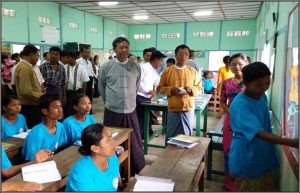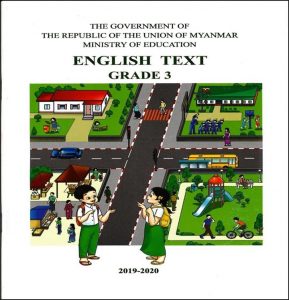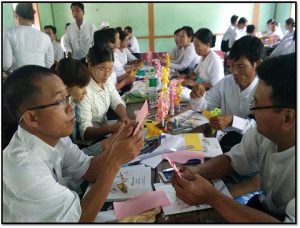10 April
More schools have been opening in the states and regions year by year, and private schools have been permitted to function in accordance with the by-laws. The number of private schools has risen from 585 earlier to 896 in 2018-2019 Academic Year.
Union Minister for Education Dr. Myo Thein Gyi
Wind of change is blowing in the trail of educational reform in the functioning of the Ministry of Education during the three year period of the incumbent government.
The National Education Strategic Plan has been drawn for (2016-2021), and nine sectors such as the basic education, the technical and vocational education, the informal and lifelong learning, the higher learning, the teacher’s training and etc. are implementing and functioning.
In line with the aims and objectives of the National Education Strategic Plan, the education policy has been laid down to have access to education by all students at school going age; to ensure that no student is being left behind in the enrollment; and that to ensure there is no dropped out kids in schools.
With the creation of new ideas for lifelong learning, the Ministry of Education is working hand in hand with the people during the three year period of the incumbent government.

The Ministry of Education is working on educational development plan on 12 priority sectors, and implementing the tasks as follows.
(1) Early Childhood Care and Development.
(2) All citizens must have access to primary education; must have the better education opportunity to under privileged students.
(3) School curriculums with different ethnic national languages must be created with the supervision of state and region governments and the ethnic nationalities’ languages and cultures must be elevated.
(4) The ratio of teachers and the students must be appropriate in the schools.
(5) The skills and teaching abilities of the teachers must be uplifted.
(6) Teaching aids and materials for the less developing regions must be filled up for the easy access of primary education to all citizens.
(7) The students with poor learning must have the opportunity for study at vocational schools for better livelihood.
(8) The universities must have the rights to draw international standard curriculums independently.
(9) The technical and vocational schools must have the equal rights to develop along with the universities.
(10) All the educational arrangements must not be a burden to the parents and the community.
(11) The budget allocated by the government and the private sectors must be utilized in transparency and in effective way.
(12) All the implementation must be based on accurate and correct data and information.
The budget for education is increasing year by year and that 2018-2019 fiscal year is allocated with MMK (2.175) trillions.

Changes in Basic Education
Union Minister for Education Dr. Myo Thein Gyi explained that not only the factors on the number of students but also the convenience of travelling and commuting to schools have been considered in opening more basic education schools.
More schools have been opened in the states and regions year by year, and that the private schools have been permitted to run their operations in line with the by-laws. The number of private schools was 585 in the past and now it stands at 896 in 2018-2019 Academic Year.
School development funds have been provided to basic education schools as well as monastic educational schools, and it now stands at MMK (58,129.788) million in 2018-2019.
Underprivileged students have been provided with educational funds and that (16,022) students have received funds in 2016-2017.
In collaboration with the World Bank, (5,376) students and (1,280) students with disabilities, total of (22,678) from (116) townships of remote areas have been provided with funds.
Buildings, schools and structures for students and relevant staff members of education have been constructed and the budget incurred was MMK (132,829.105) millions in the past and now MMK (251,475.878) million in 2018-2019.
The number of students was also increased from (8.9) millions to (9.14) millions in 2018-2019. The number of teachers also increased from (368,709) to (404,444) in2018-2019.
Rote learning system has been reforming into new learning system of the 21st century with the new curriculums which emphasizes the concept of thinking, the innovation, the participation and cooperation, the smooth interaction, the concept of problem solution, and the ability of peaceful coexistence from the year 2016-2017. In the implementation tasks, JICA assisted for KG + 12 grades new educational system, and the ADB and EU assisted middle and high school system beginning 2016-2017. The classes such as the KG, the Grade -1, the Grade – 2, the Grade – 3 and Grade – 6 have been equipped with new curriculums. With a view to enable the teachers to cope with the new teaching, the central level training have been provided, and that multiplier training courses are to be provided at the states, regions, and townships respectively, according to the union minister.
In coping with the new curriculums, the teachers have been imparted with the new concept of teaching.
Due to the new teaching and assessment procedure, the primary students have learned the skills in the participation and in the question and answer abilities.
Assessment and evaluation system has been examined with the achievement of learning for four occasions, and that the question types for the matriculation examination have been changed from rote learning method to meaningful learning.
The changes and reform have been resulted with success as more students passed the assessment and evaluation in their learning. The number of students that appeared in the matriculation examination have stood at (0.85) millions in 2019. In felicitating ethnic nationalities languages at schools, total of (5,161) teaching assistants from the local area have been appointed in December 2017.
In uplifting and inspiring various ethnic nationalities’ languages, literatures, cultures, and traditions, more funds have been awarded to (12,248) basic education schools; to (54) various ethnic nationalities’ languages; to (28,783) school teachers including professionals in 2018-2019.
Reform in informal and lifelong learning
Works are in progress in the reform tasks for informal learning and lifelong learning for those students who are deprived of regular schoolings by offering them such as that of vocational training and that of income generating training along with the encouragement of reading habits with impetus.
Informal education for the primary school level as well as middle school level have been provided in (81) townships, and subsequently embraced (28,146) students for primary levels and (191) students for middle schools levels in 2018-2019.
With a view to uplift the elderly literacy rate, (4,482) teaching circles have been staged in (11) districts deployed with (5,703) teacher, where (44,062) adults have become literate.

Technical and vocational sectors
Over three years period of the new government, many tasks have been implemented such as that of opening more schools; that of opening regular course; that of skill course; that of appointing more teachers; that of job related trainings; that of building structures; that of providing teaching aids; that of providing educational funds; the of cooperation between the government and the private sectors.
From 2016 to 2018, motley assortment of schools have been expanded and commissioned such as NVTI vocational courses; ELPS English courses; technical courses from Sea Lion Co. Ltd., and that of the School of Industrial and Education (SITE).
Additional teachers have been beefed up in schools with (665) teachers over the three years, and that (278) news teachers are to be appointed in 2018-2019.
Total of (60) schools and centers have been opened for Government Technical College; for Government Technical High School; and for Technical Enhancement Centers, accommodating (19,676) students.
Various and different short term vocational skills starting from mobile repair course to facial makeup beautifying course numbering (23) categories have been imparted to the trainees.
In cooperation with the government and the private sector, related vocational training seminars were conducted in major cities. As a result, from the basic sewing and cloth making course to the blacksmith and ironwork course have been conducted. In this regards, (42) times of courses have been implemented for (1,907) persons.
The companies involved in the training courses are the Total E and P Myanmar; Mottama Gas Transportation Company Limited (Yadanar Project); Wolistic Interest through health – Myanmar (WITH).
With the cooperation of KOICA, the TVET Teacher Training Institute-TTTI) is to be instituted in Yangon, where the course on Electronic Technology ; Electrical Power Technology ; Mechanical Technology ; and Automobile Technology would be imparted.
Other foreign organizations namely UNESCO and The Deutsche Gesellschaft für Internationale Zusammenarbeit (GIZ) are to provide various courses as Myanmar Centre in collaboration with KOICA; JICA; SDC; Swiss contact; GIZ; ADB; and EU.
Moreover, hotel and tourism services training courses are to be conducted in the near future with the assistances of the private organizations and partner organizations in major cities.
In getting assistances from Official Development Assistance (ODA), a plan has been approved for establishing Japan- Myanmar Aung San Vocational Training Institute (JMASVTI).
The TVET Forum was held on 15 and 16 July 2016 at the Myanmar Convention Center (2) in Nay Pyi Taw and the ASEAN Regional Technical and Vocational Education and Training Conference 2017 was held on 13 and 14 June 2017.
The Organizational of the TVET Seminar was held on 3 December 2018 and that Workshop on Operationalization of UNEVOC Centre in Myanmar was held on 4 December 2018 with the assistance of UNESCO and GIZ.
Reform in higher education sector
Total of (134) universities, degree colleges, and colleges are being commissioned in 2016 to 2018.
Over the three years period of the new government, total of (4,269) deputy-directors general, professors, assistant professors, associate professors, lecturers and assistant lecturers have been promoted, and that (64) part time faculty members have been recruited. The number of faculty members stood at (21,699) in 2015-2016 and increased to (22,533) in 2017-2018.
Accommodations and hostels have been arranged for the convenience of the students in (46) universities and colleges.
The number of students attending at day and the distant education students has increased in three years’ time.
Classes for Marine Science (1) and Fisheries and Aquaculture have been offered beginning December 2018.
Masters’ courses for Engineering and Architecture have been reopened in 2016-2017 and that (243) students are attending the classes.
Out of (134) universities, degree colleges and colleges, total of (142,884) students have been conferred with diplomas, degrees, masters’ and doctorates in the year 2018.
In strengthening the research works, more funds are being allocated year by year, and that the current fiscal year is honored with MMK (532.954) millions. Moreover, the faculty members have contributed with (3,841) research papers in 2018.
Total of (4,425) representatives have been dispatched to foreign countries to obtain Masters’ and doctorates as well as attending seminars and courses.
Total of (85) foreign professors and professionals have visited Myanmar and imparted knowledge and lectures in 2018.
Various functions and fairs related to education have been arranged up to (80) events in 2017-2018. Moreover, cooperation and collaboration are being made on educational matters with Free University of London and British Council.
The 19th ASEAN University Games was held from 10 to 19 December 2018 in Nay Pyi Taw.
Those students who obtained the Diploma in Teaching Education (DTEd) would have the opportunity to further pursue B. Ed; BA; and B Sc (Education).
The current distant education system is to be revamped and modified with a view to enhanced the quality education.
Cooperation with International Organizations
With the aid and assistances of the UNESCO, more reliable data and information collection would be made through Education Management Information System (EMIS) with a view to establishing baseline data for the whole country.
Other capacity building courses have been imparted to educational staff members and officers. The plans included Equipping Youth for Employment Project –EYE with the assistance of ADB.
With the assistance of the Australian Government, the Myanmar Education Quality Improvement Program (My-EQIP) is under implementation.
In collaboration with the EU, the plan namely “Financial and Social Inclusion in Myanmar” is being carried out.
As part of capacity building for the teachers, the “Teacher Mentor and School Cluster Supporting Program” is being implemented with the World Bank, in addition to the “Early Grade Mathematics Assessment – EGMA” and the “Early Grade Reading Assessment–EGRA.”
An essential summary report on the “Public Finance for Children in Education Budget Brief Development” has been released in Myanmar language and English language.
Among the achievement and success of the Ministry of Education, the “Seminar on Strengthening TVET in Myanmar within the Framework of SDG4” and the “Access to Education Policy Dialogue” have been noted into records with credit.
Some reports and disseminations have been compiled and released in cooperation with the UNICEF on the theme “Out of School Children Initiate–OOSCI”, with a view to reducing the number of such children in the country.
One of the salient researches being undertaken was the “South East Asia Primary Learning Metric (SEA-PLM)”.
Understanding the requirements and needs in performances and abilities of the staff under the Ministry of Education, an appropriate and systematic Human Resource Development Plan (HRD Plan) has been crafted.
In line with the aim and objective of the Myanmar Sustainable Development Plan, the Ministry of Education is implementing reforms systematically and effectively with transparency despite the challenges on various issues in achieving and arriving at the desired goals to the best of the abilities.
By Khin Yadanar
Photo by July Moe (Myanma Alin)
Translated by UMT (Ahlon)



